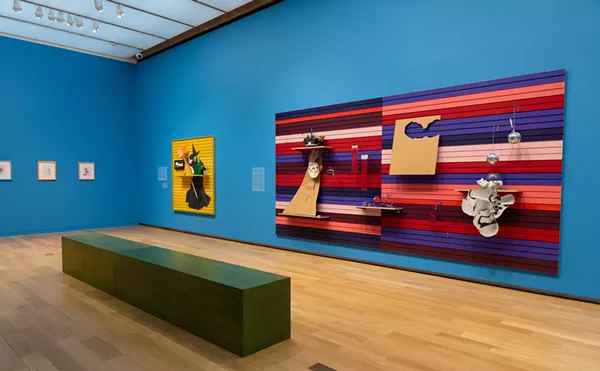No show wears its love for language and land more proudly than FX's Justified, which ended its six-year run Tuesday night. Based on a novella by Elmore Leonard and starring squinty-eyed sex symbol Timothy Olyphant, the hillbilly noir never received the critical adulation or the audience one might expect for such a consistently moving and entertaining series. Boasting some of the best writing, acting, directing and mythologizing anywhere on television, Justified left the innovations and the boundary-pushing to its more self-serious Golden Age cohorts, delving instead into the familial histories and economic dysfunctions that make its setting, Kentucky's Harlan County, such a dangerous place to call home.
Justified's soul rests not in its heart but at its hip, right next to the gun holster. In the pilot, Olyphant's trigger-happy U.S. Marshal Raylan Givens is transferred from Miami to Lexington, just a few hours from Harlan, where he grew up as the unhappy son of a hired thug who worked for the Crowders, the criminal clan that ran the county a generation ago. The coal industry in Kentucky has collapsed: "It's [now] cheaper to take the tops off mountains and let the slag run down and ruin the creeks," explains ex-miner Boyd Crowder, played by Walton Goggins. He's the first to acknowledge that mineworkers were exploited early and often by their bosses — it seems that damn near everyone in Harlan is making up for a lost livelihood in the former company town by getting involved in the drug business. Each season of Justified has focused on a different drug — meth, pot, oxy, heroin — tracing their history in the region and the violence they now inspire.
But Justified isn't so much The Wire in coal country as it is a lower-stakes (but just as bloody) Game of Thrones in the 21st century, particularly in its depiction of how each character is burdened or buoyed by familial inheritances of land, standing, alliances and rivalries. Despite his hatred of his father, Raylan is referred to as "Arlo's boy" by the old-timers, and the federal officer's series-spanning aim to put the charmingly villainous Boyd in prison (or 6 feet under) is informed by their fathers' thorny relationship.
Showrunner Graham Yost has populated Harlan with a vipers' nest of colorful schemers and losers, including standouts like Margo Martindale's criminal matriarch Mags Bennett, Damon Herriman's dumb-as-a-box-of-hair-with-swastikas-drawn-on-it crook Dewey Crowe, and Jere Burns's extravagantly eyebrowed, women's-tennis-loving Dixie Mafia functionary Wynn Duffy.
Though it's rare to find an out-and-out dull hour of the show, Justified invariably becomes more exciting toward the middle of each season, when the murder mysteries that begin each 13-episode arc begin to reveal the invisible wires that connect Harlan's seemingly disparate psychopaths and pragmatic killers. But, of course, partnerships built on greed and violence are shaky at best. Leonard, who served as an executive producer on the show until his death two years ago, was never convinced of the intelligence of most criminals anyway, resulting in a lot of bullets landing in the shooter's feet.
The sprawling cast in Harlan and Lexington and the characters' intimate knowledge of the land — down to what kind of cheap concrete a local dam is made of, which happens to be the same one that forms the base of the Statue of Liberty — contribute to an impressively detailed and convincing sense of place — the series' greatest achievement. The real Harlan County apparently loves the show back.
Justified shares its characters' sense of nostalgia for home and history, but tempers that affection with necessary skepticism. Each season finale has been serenaded by a different rendition of Darrell Scott's "You'll Never Leave Harlan Alive" — a warning to Raylan this excellent final season, which finds the marshal delaying a transfer to Florida, where he'll raise his baby daughter, so that he can try to nail Boyd Crowder one last time. Raylan has always felt the tension between pursuing justice the legal way and the Harlan way — an ongoing theme of the series. And his casual arrogance, which veers between heroic and off-putting, won't let him quit the hunt, even if he loses his badge in the process.
It's possible Justified never got its critical due because Raylan doesn't fit into the antihero mold so in vogue these days. Smart-mouthed and anti-authoritarian, he's an enforcer on the side of good who's easy to root for — closer to Buffy than Walter White. But frequently overlooked is the fact that Raylan's also a law enforcement official you don't necessarily want on the streets. Justified wants you to cheer him on in the short term, but his cockiness and vendettas are more obvious than the wide-brimmed cowboy hat he wears everywhere, even in his SUV. In the long term, it's impossible not to wonder how he's so blithe about having probably killed a lot more men than the criminals he puts down.
Amid the self-conscious stylishness, the scenes of regional decay and its moral ambiguity, Justified distinguishes itself from every other show. Its folksy, snarky, frequently hilarious dialogue is a kind of cowboy poetry that mixes the Shakespearean and the profane. When Raylan pits one baddie against another earlier in this final season, he practically rubs his hands together in anticipation as he crows, "Wonderful things can happen when you sow seeds of distrust in a garden of assholes."
Threats like "You insist upon the track thus far set upon, there will be consequences" and "As you undertake your grievin', may that guide you as you contemplate your next move" are routine, and uttered with metered and menacing elegance by Olyphant, Goggins, or any of the other uniformly excellent actors. The scripts add a literary thrill to the show's viscerally choreographed shoot-'em-up pleasures. Laughing at idiots has never felt so smart.
Inkoo Kang is the TV critic for the Village Voice. She publishes widely on film and television and tweets at @thinkovision.












